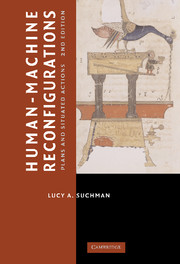Book contents
- Frontmatter
- Contents
- Acknowledgments
- Preface to the 2nd Edition
- Introduction
- 1 Readings and Responses
- 2 Preface to the 1st Edition
- 3 Introduction to the 1st Edition
- 4 Interactive Artifacts
- 5 Plans
- 6 Situated Actions
- 7 Communicative Resources
- 8 Case and Methods
- 9 Human–Machine Communication
- 10 Conclusion to the 1st Edition
- 11 Plans, Scripts, and Other Ordering Devices
- 12 Agencies at the Interface
- 13 Figuring the Human in AI and Robotics
- 14 Demystifications and Reenchantments of the Humanlike Machine
- 15 Reconfigurations
- References
- Index
- Frontmatter
- Contents
- Acknowledgments
- Preface to the 2nd Edition
- Introduction
- 1 Readings and Responses
- 2 Preface to the 1st Edition
- 3 Introduction to the 1st Edition
- 4 Interactive Artifacts
- 5 Plans
- 6 Situated Actions
- 7 Communicative Resources
- 8 Case and Methods
- 9 Human–Machine Communication
- 10 Conclusion to the 1st Edition
- 11 Plans, Scripts, and Other Ordering Devices
- 12 Agencies at the Interface
- 13 Figuring the Human in AI and Robotics
- 14 Demystifications and Reenchantments of the Humanlike Machine
- 15 Reconfigurations
- References
- Index
Summary
This total process [of Trukese navigation] goes forward without reference to any explicit principles and without any planning, unless the intention to proceed to a particular island can be considered a plan. It is nonverbal and does not follow a coherent set of logical steps. As such it does not represent what we tend to value in our culture as “intelligent” behavior.
(Gladwin 1964: 175)This chapter turns to recent efforts within anthropology and sociology to challenge traditional assumptions regarding purposeful action and shared understanding. A point of departure for the challenge is the idea that commonsense notions of planning are not inadequate versions of scientific models of action, but rather are resources for people's practical deliberations about action. As projective and retrospective accounts of action, plans are themselves located in the larger context of some ongoing practical activity. And as commonsense notions about the structure of that activity, plans are part of the subject matter to be investigated in a study of purposeful action, not something to be improved on or transformed into axiomatic theories of action.
The premise that practical reasoning about action is properly part of the subject matter of social studies is due to the emergence of a branch of sociology named ethnomethodology. This chapter describes the inversion of traditional social theory recommended by ethnomethodology and the implications of that inversion for the prowler of purposeful action and shared understanding.
- Type
- Chapter
- Information
- Human-Machine ReconfigurationsPlans and Situated Actions, pp. 69 - 84Publisher: Cambridge University PressPrint publication year: 2006
- 4
- Cited by

